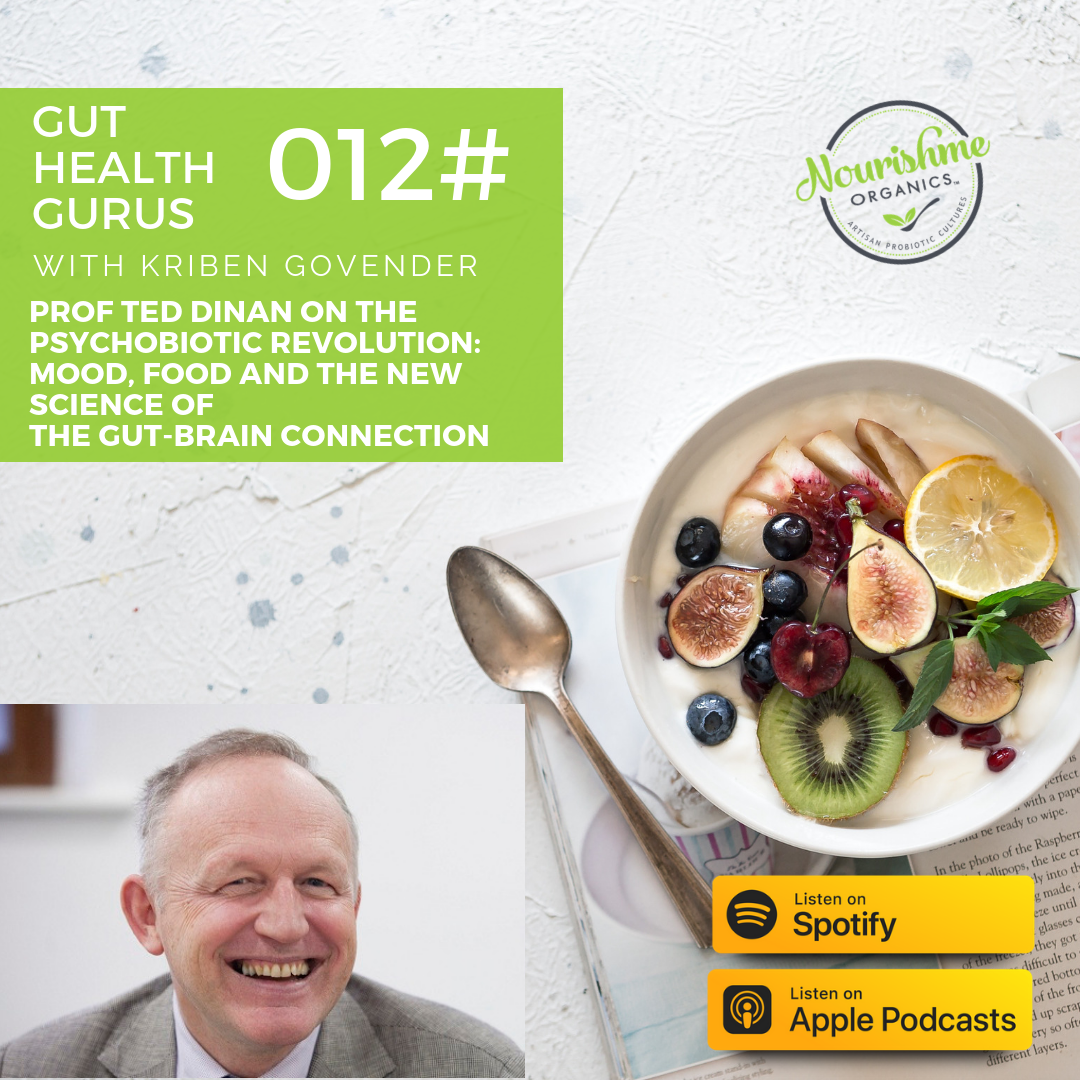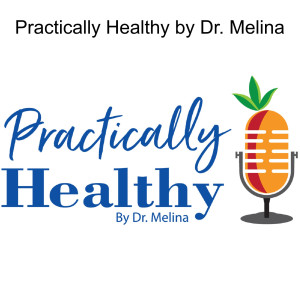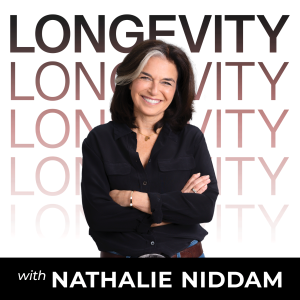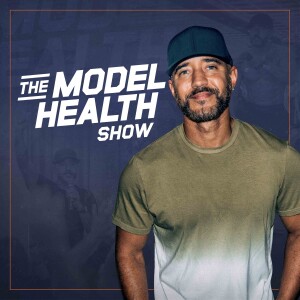

The Gut Health Gurus Podcast
Professor Ted Dinan on The Psychobiotic Revolution: Mood Food and the New Science of The Gut Brain Connection
2019-01-25
Kriben Govender (Honours Degree in Food Science & Technology) and James Shadrach (Honours Degree in Psychology) interview the father of Psychobiotics, Professor Ted Dinan. We discuss how the gut and brain is connected, and the future of probiotics, prebiotics and food as a treatment option for IBS, anxiety, depression, stress and mood management. Bio: Ted Dinan is Professor of Psychiatry at University College Cork. He was previously Chair of Clinical Neurosciences and Professor of Psychological Medicine at St. Bartholomew’s Hospital, London. Prior...
Kriben Govender (Honours Degree in Food Science & Technology) and James Shadrach (Honours Degree in Psychology) interview the father of Psychobiotics, Professor Ted Dinan. We discuss how the gut and brain is connected, and the future of probiotics, prebiotics and food as a treatment option for IBS, anxiety, depression, stress and mood management.
Bio:
Ted Dinan is Professor of Psychiatry at University College Cork. He was previously Chair of Clinical Neurosciences and Professor of Psychological Medicine at St. Bartholomew’s Hospital, London. Prior to that, he was a Senior Lecturer in Psychiatry at Trinity College Dublin. He has worked in research laboratories on both sides of the Atlantic and has a PhD in Pharmacology from the University of London. He is a Fellow of the Royal Colleges of Physicians and Psychiatrists and a Fellow of the American College of Physicians. His main research interest is on the role of the gut microbiota in influencing brain function and development. Within this context he has focused on depression and irritable bowel syndrome. He has made significant contributions to the literature on the regulation of the hypothalamic-pituitary-adrenal axis in situations of stress. In 1995 was awarded the Melvin Ramsey Prize for this research into the biology of stress. His current research is funded by Science Foundation Ireland, the Health Research Board and the European Union through FP7. He has published over 400 papers and numerous books on the pharmacology and neurobiology of affective disorders.
Research interests:
The “Brain-Gut-Microbe Axis” research addresses the communication between the brain and gut and how it can be influenced by the gastrointestinal microbiota. This is an area of significance in infancy, where important links between diet, microbes and cognition are established. The influence of the microbiota on obesity and metabolic syndrome are also increasingly recognised. A better understanding of the role of this axis in the stress response, and its links with other debilitating psychiatric conditions, will help provide new treatment and management strategies – these will represent opportunities for both the food ingredients business and the pharmaceutical industry. Within this context papers Prof. Dinan’s group have promoted the concept of Psychobiotics, probiotics that have a mental health benefit.
Professional activities:
Prof. Dinan runs a clinic for treatment refractory depression at Cork University Hospital. The research focus at this clinic is on biomarkers of response and the development of new therapies.
Publications:
Please see http://orcid.org/0000-0002-2316-7220
Topics discussed:
Brain Gut - Microbiome Axis
What are Psychobiotics?
Modulating the gut Microbiome to treat psychological disease and improve mental health
Species of Psychobiotic bacteria
Probiotic health claims
European Food Safety Standard for claiming health benefits of probiotic
Food industry issues on probiotic health claims
Convergence of Food and Pharma
Treatment options for Mental health issues
How the Gut and Brains are connected?
Bi- directional Vagus communication
Bacterial communication via the vagus nerve
Importance of short chain fatty acids via Fibre
Tryptophan metabolism
Synthesis of Tryptophan by gut microbiota
Immune system cytokines and brain activity
Decline of Bifidobacteria with age
The effect of Bifidobacterium longum 1714 on tryptophan levels and mood
https://www.ncbi.nlm.nih.gov/pubmed/27801892
Mechanism of tryptophan and stress
The impact of elevated and sustained Cortisol
Reduction of Cortisol by Bifidobacteria
Cushing’s disease
Cortisol and Depression
Future prospect of improving cardiovascular health with Psychobiotics
The impact Birth Method on asthma, allergies, antibiotics, obesity and stress response
Antibiotics and Depression
Early life Antibiotics use and Obesity Risk
Impact of Anti- Depressants on gut microbiota
Lithium and gut microbiota alteration
Antidepressants and weight gain
Firmicutes and Bacteroidetes ratio, weight gain and Antidepressants
Bariactric surgery and alteration of the gut microbiota composition
Faecal Matter Transplants and the risk of depression transfer
Transferring the Blues Study
https://www.ncbi.nlm.nih.gov/pubmed/27491067
The Psychobiotic Revolution: Mood, Food, and the New Science of the Gut-Brain Connection by Scott C. Anderson (Author), John F. Cryan (Author), Ted Dinan (Author)
https://www.amazon.com/Psychobiotic-Revolution-Science-Gut-Brain-Connection/dp/142621846X
The discovery of lactic bacteria as a treatment for depression in 1910
Opportunity for the development of food based mood enhancers (Prebiotics or Probiotics)
Benefits of the Mediterranean diet for mental health
Processed Foods, Trans fats and Mental Heath
Benefits of Aerobic Exercise
Anti anxiety effect of Prebiotics- Fructose Oligosaccharides (FOS Inulin) and Galactooligosaccharides (GOS)
Good Food and Mood
Bifidogenic effects of Prebiotics
What is the potential Road Map for Psychobiotic use in a clinical setting?
Nutritional Psychiatry- Diet and Exercise
Education of Health Care Professionals
Fibre intake and Mental Health
Is there any link between Stress and IBS?
Anxiety + IBS link
Bifidobacterium infantis 35624 and IBS
https://www.ncbi.nlm.nih.gov/pubmed/28166427
“A good diet is the best way to deliver nutrients to the brain"
Ted’s No 1 recommendation for mental health
Ted’s Diet and Lifestyle habits
Brought to you by:
Nourishmeorganics- Gut Health Super Store- Shine from the Inside
https://www.nourishmeorganics.com.au/
Shop Prebiotic Products here (10% off using code Ted):
FOS Inulin
https://www.nourishmeorganics.com.au/products/organic-fos-inulin-powder-200g
GOS
https://www.nourishmeorganics.com.au/products/bimuno-daily-prebiotic-30-x-3-65-sachets
Allele Microbiome- Gut Microbiome Testing
Shop Microbiome Stool testing (10% off Gut Explorer Pro using code: gutlove)
https://www.allele.com.au/collections/frontpage/products/gut-microbiome-analysis
Connect with Professor Ted Dinan:
Twitter: https://twitter.com/teddinan
Website- http://apc.ucc.ie/ted_dinan/
Connect with Kriben Govender:
Facebook- https://www.facebook.com/kribengee/
Instagram- https://www.instagram.com/kribengovender/
Youtube- https://www.youtube.com/c/Nourishmeorganics?sub_confirmation=1
Gut Health Gurus Facebook Group: https://www.facebook.com/groups/nourishmeorganics/
Download links
If you enjoyed this episode and would like to show support:
1) Please subscribe on Itunes, Youtube and Spotify
https://itunes.apple.com/au/podcast/gut-health-gurus-podcast/id1433882512?mt=2
2) Please leave a five star rating on Itunes and a thumbs up on Youtube
3) Please leave a positive comment on Itunes and Youtube
3) Please leave a positive comment on our Podcast page
4) Share your favourite episode on Facebook, Instagram and Stories
5) Let your friends and family know about this Podcast by email, text, messenger etc
Comments (3)
More Episodes
All Episodes>>You may also like
Create Your Podcast In Minutes
- Full-featured podcast site
- Unlimited storage and bandwidth
- Comprehensive podcast stats
- Distribute to Apple Podcasts, Spotify, and more
- Make money with your podcast
It is Free












